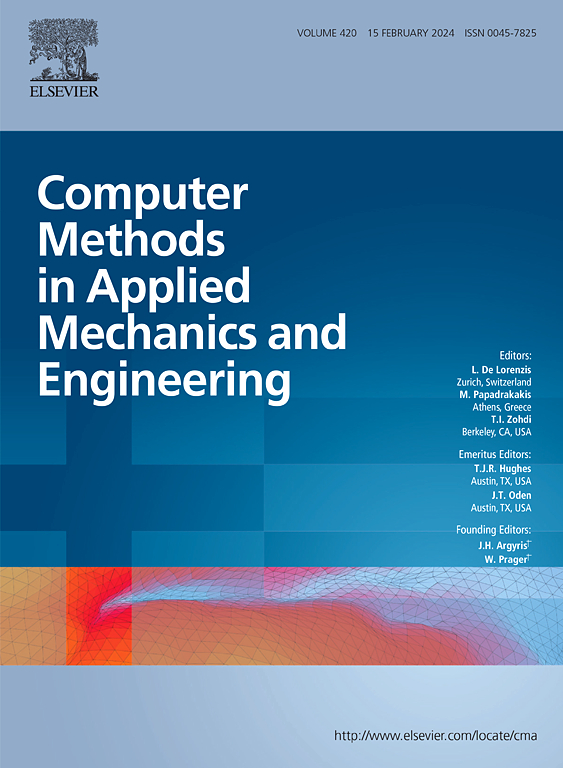随机深层材料网络作为非线性非均质材料随机均质化的有效替代物
IF 6.9
1区 工程技术
Q1 ENGINEERING, MULTIDISCIPLINARY
Computer Methods in Applied Mechanics and Engineering
Pub Date : 2025-04-18
DOI:10.1016/j.cma.2025.117994
引用次数: 0
摘要
重新制定了基于相互作用的深度材料网络(IB-DMN),以将相体积分数与IB-DMN的拓扑参数解耦。由于相体积分数不再受拓扑参数的影响,随机IB-DMN一方面可以预测任意相体积分数的响应,另一方面可以通过在参考IB-DMN的拓扑参数中引入不确定性来构建随机IB-DMN,该参考IB-DMN使用从全场线性弹性均匀化中获得的数据进行训练。允许捕获由微观结构组织(如相位聚类)引起的可变性。将所提出的随机IB-DMN的非线性预测结果与直接数值模拟(DNS)在有限应变条件下单向纤维增强基复合材料二维随机体积元(SVEs)上的预测结果进行了比较。平面内单轴应力和剪切试验结果表明,所提出的随机IB-DMN能够再现随机非线性响应,其随机特征与在SVE实现上进行的DNS预测相同。本文章由计算机程序翻译,如有差异,请以英文原文为准。
Stochastic deep material networks as efficient surrogates for stochastic homogenisation of non-linear heterogeneous materials
The Interaction-Based Deep Material Network (IB-DMN) is reformulated to decouple the phase volume fraction from the topological parameters of the IB-DMN. Since the phase volume fraction is no longer influenced by the topological parameters, on the one hand the stochastic IB-DMN can predict the response of arbitrary phase volume fraction, and on the other hand the stochastic IB-DMN can be constructed by introducing uncertainties to the topological parameters of a reference IB-DMN, which is trained using data obtained from full-field linear elastic homogenisation, allowing to capture the variability resulting from the micro-structure organisation such as a phase clustering.
The non-linear predictions of the proposed stochastic IB-DMN are compared to those from Direct Numerical Simulation (DNS) on 2D Stochastic Volume Elements (SVEs) of unidirectional fibre-reinforced matrix composites in a finite-strain setting. The results from in-plane uni-axial stress and shear tests show that the proposed stochastic IB-DMN is capable of reproducing random non-linear responses with the same stochastic characteristics as the predictions of the DNS conducted on SVE realisations.
求助全文
通过发布文献求助,成功后即可免费获取论文全文。
去求助
来源期刊
CiteScore
12.70
自引率
15.30%
发文量
719
审稿时长
44 days
期刊介绍:
Computer Methods in Applied Mechanics and Engineering stands as a cornerstone in the realm of computational science and engineering. With a history spanning over five decades, the journal has been a key platform for disseminating papers on advanced mathematical modeling and numerical solutions. Interdisciplinary in nature, these contributions encompass mechanics, mathematics, computer science, and various scientific disciplines. The journal welcomes a broad range of computational methods addressing the simulation, analysis, and design of complex physical problems, making it a vital resource for researchers in the field.

 求助内容:
求助内容: 应助结果提醒方式:
应助结果提醒方式:


